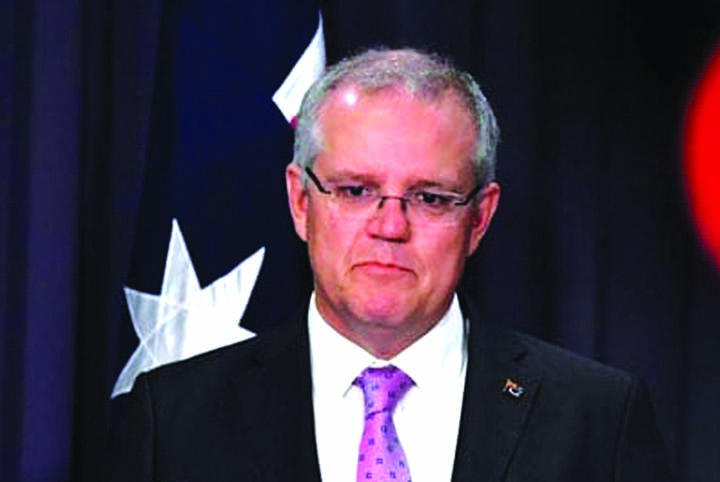
Reuters, Sydney
Australia will join the United States in a security mission to protect merchant vessels traveling through key Middle East waterways after Iran seized a British-flagged vessel, Prime Minister Scott Morrison said on Wednesday.
Foremost among the areas to be patrolled is the Strait of Hormuz, between Oman and Iran, through which about one-fifth of the world’s seaborne crude flows out of the Gulf.
Global commodity trading has been rocked in recent months by the seizure of the British tanker and a series of attacks on international merchant vessels that the U.S. and Britain have blamed on Iran, though it denies involvement. Britain this month became the first U.S. ally to announce its participation.
“This destabilizing behavior is a threat to Australia’s interests in the region,” Morrison told a news conference in Canberra. “Our contribution will be limited in scope and it will be time-bound.”
Morrison said Australia would send a P-8A Poseidon surveillance plane to the Middle East for one month before the end of 2019, while an Australian frigate would be deployed for six months from January.
Australia is a staunch ally of the United States, which in recent months has urged partners to do more for global security.
Iran has denounced U.S. efforts to set up the coalition and insisted countries in the region can protect waterways and work towards signing a non-aggression pact.
Foreign Minister Mohammad Javad Zarif on Wednesday told the Stockholm International Peace Research Institute (SIPRI):
“No amount of foreign military presence can prevent insecurity in this region. You cannot have an island of security … while the U.S. is waging an economic war against Iran.”
The Gulf state of Bahrain, which hosts the U.S. Navy’s Fifth Fleet, this week became the first Arab country to announce it would join the new mission, through a tweet from its ambassador to the United States. The Bahraini government was unable to provide further details when asked by Reuters.
Sources briefed on the U.S. plan had told Reuters that foreign participation could include anything from sending vessels and personnel to offering bases, logistical support, liaison officers or financing.
Bahrain already serves as headquarters to the U.S.-led Combined Maritime Forces, a 33-nation alliance that carries out security and anti-piracy operations in the region.
Israeli media this month quoted Foreign Minister Israel Katz as telling a closed-door meeting that Israel was part of discussions and intelligence-sharing within the new coalition, though Israeli officials declined to confirm or deny this.
Katz told Israel’s Ynet TV: “In general, Israel is involved in what is happening in the region in everything regarding the confrontation with Iran, putting the brakes on Iran … The United States, which is spearheading a sanctions policy, certainly sees a partner in Israel.”
Most European countries, which disagree with a U.S. decision to reimpose sanctions on Iran, have been reluctant to sign up to the U.S.-led mission for fear of adding to tension in the region.
U.S. President Donald Trump withdrew Washington in 2018 from a big-power deal that had scrapped international sanctions in return for curbs on Iran’s nuclear program.
Australia will join the US-led mission to protect shipping through the Strait of Hormuz amid heightened tensions with Iran, Prime Minister Scott Morrison announced Wednesday.
Morrison said Australia would send a “modest” contribution-including a frigate, a P8 maritime surveillance aircraft and support staff-to the mission, which will also involve British and Bahraini forces.
“Our contribution will be limited in scope and it will be time-bound,” Morrison said, expressing concern about security incidents in the vital shipping lane in the past few months.
“This destabilising behaviour is a threat to Australian interests in the region,” he said in a joint statement with his foreign and defence ministers.
US Secretary of State Mike Pompeo and Defense Secretary Mark Esper had pressed for Australia’s help patrolling the strategic waterway during a visit to Sydney earlier this month.
The move followed a spate of incidents-including the seizure of ships-involving Iran and Western powers, in particular Britain and the US, centred on the vital Gulf channel.
Defence Minister Linda Reynolds said Australian military staff would in coming weeks join the security operation’s headquarters in Bahrain, which announced its involvement in the operation on Tuesday.
The P8 Poseidon aircraft will patrol the region for a month, later in the year. The frigate, with a crew of some 170, will not be deployed to the joint operation until January and take part for six months, she said.
Morrison stressed that the deployment would be “modest, meaningful and time-limited” while defence experts said it was likely a “re-tasking” of planned deployments to the region to satisfy US requests.
The US had been struggling to piece together an international coalition to protect cargo ships travelling through the Gulf, with allies concerned about being dragged into conflict with Iran.
Britain eventually agreed to participate two weeks ago, and Morrison’s government has debated the move since Pompeo and Esper made their direct appeal at the beginning of the month.
US President Donald Trump has been trying to mount a campaign of “maximum pressure” against Tehran since he withdrew the US from a landmark 2015 deal placing curbs on Iran’s nuclear programme and began reimposing sanctions, urging reluctant Western allies to follow suit.
But European countries have declined to join the maritime security force for fear of harming European efforts to rescue the nuclear treaty.
Iran has seized three tankers in strategic Gulf waters since last month, including a British-flagged vessel.
That came after British Royal Marines helped impound a tanker carrying Iranian oil off the British overseas territory of Gibraltar on July 4.
Britain suspected it was destined for Syria in defiance of European Union sanctions, which Iran denies.
The US and its Gulf allies have also accused the Islamic republic of carrying out several mysterious attacks on ships in the region. Tehran has denied involvement.

